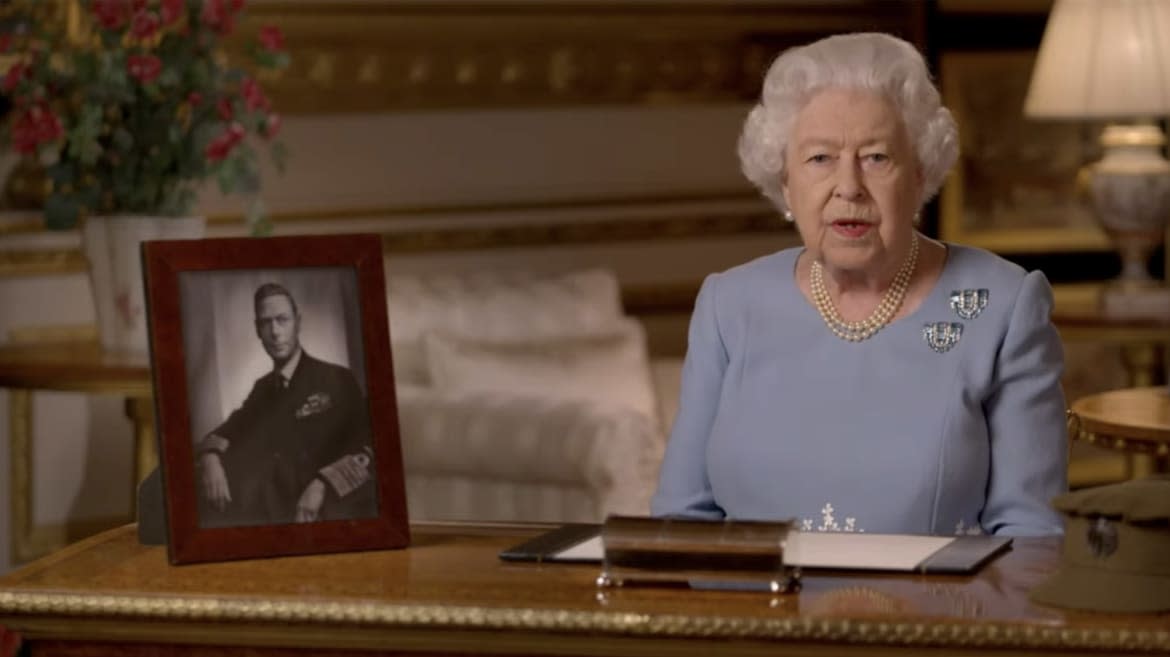The Queen’s Coronavirus Message to Britain: ‘Never Give Up, Never Despair’

The Queen gave a 75th anniversary VE Day speech Friday night that doubled as a rallying cry against coronavirus. “Never give up, never despair, that was the message of VE Day,” she told the British people.
Second World War heroes would “recognize and admire,” the sacrifices the British were making today in the fight against coronavirus, the Queen added. It was her second major coronavirus-themed speech to the nation.
“It may seem hard that we cannot mark this special anniversary as we would wish. Instead we remember from our homes and our doorsteps. But our streets are not empty,” the Queen said, “They are filled with the love and the care that we have for each other.”
The reference was poignant because the 75th anniversary celebrations had been set to include one of the great royal set pieces of 2020; a giant street party, radiating out from Buckingham Palace, to mark the 75th anniversary of Britain’s “Victory in Europe.”
She gave her speech timed to the second that her father, George VI, made his VE Day broadcast to the nation 75 years ago.
The Queen drew an explicit parallel between the battle against the Nazis and the battle against the virus as she said: “When I look at our country today, and see what we are willing to do to protect and support one another, I say with pride that we are still a nation those brave soldiers, sailors and airmen would recognize and admire.”
Her Majesty’s grim description of World War II felt horribly apposite: “At the start, the outlook seemed bleak, the end distant, the outcome uncertain. But we kept faith that the cause was right—and this belief, as my father noted in his broadcast, carried us through.”
VE Day 1945 saw one of the greatest parties the U.K has ever known, after the Germans, in one of the more remarkable upsets in military history, admitted defeat and surrendered, bringing to an end the European phase of the war (Japan surrendered in August, after atomic bombs were dropped on Hiroshima and Nagasaki).
Millions of Britons thronged the streets, including, at the party’s epicenter, Buckingham Palace, the young Princesses Elizabeth and Margaret (“Poor darlings, they have never had any fun yet,” their father, the king, wrote in his diary) among them.
It was an extraordinarily poignant sight, therefore, to see the famous ceremonial streets of London outside of Buckingham Palace completely deserted this evening. The country that famously could not be cowed by the Blitz had little choice, when faced with the terrors of the coronavirus, but to emulate behaviors more akin to the darkest days of the war than its ending.
The Mall should have been packed, the crowds should have been flowing up and around the Victoria Monument, down Constitution Hill, Canada Gate and Spur Road, spilling back hundreds deep into Green Park.
Instead of which—nothing. A news helicopter hovered over an abandoned Buckingham Palace.
No royal standard fluttered from the mast atop the palace. The Queen has been in Windsor for weeks now and it was from here that the nation’s TV screens cut to Her Majesty, sitting behind her desk in the White Drawing Room with a picture of her father in pride of place on it.
Her address was intercut with Pathé newsreel showing the scenes outside Buckingham Palace 75 years ago.
The Queen spoke of her memories of the “jubilant scenes” she had witnessed from the balcony of Buckingham Palace, but did not reflect on or mention her own experience of being allowed to mingle with the public celebrating on the streets of London.
In 2020, Britons had been urged to sing the classic wartime Vera Lynn song “We’ll Meet Again” from their doorsteps once the speech finished, and many did so with gusto.
Get our top stories in your inbox every day. Sign up now!
Daily Beast Membership: Beast Inside goes deeper on the stories that matter to you. Learn more.

